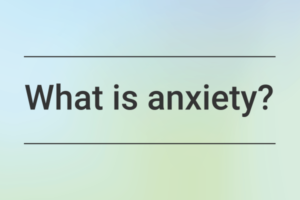Anxiety disorders are the most common mental illness in the world affecting millions of adults in the world aged 18 and older. While there are many different types of anxiety disorders, they all share one common symptom: excessive worry. In addition to excessive worry, people with anxiety disorders may also experience physical symptoms such as chest pain, shortness of breath, or headaches. If you are struggling with anxiety, it is important to identify your triggers and address them head-on. In this blog post, we will discuss some surprising causes of anxiety and how to address them.
Contents
What Is Anxiety?
 Anxiety is your body’s natural response to stress. It’s a feeling of uneasiness, worry, or fear. Everyone feels anxious at times. But if your anxiety is constant or overwhelming, it may be a sign of an anxiety disorder.
Anxiety is your body’s natural response to stress. It’s a feeling of uneasiness, worry, or fear. Everyone feels anxious at times. But if your anxiety is constant or overwhelming, it may be a sign of an anxiety disorder.
There are many different types of anxiety disorders, each with its own set of symptoms.
Anxiety disorders can run in families, but they can also be caused by physical health problems, major life changes (like starting college), and even certain medications.
There may be many signs of anxiety, but some common ones are:
- Restlessness
- Fatigue
- Difficulty concentrating
- Irritability
- Muscle tension
- Sleep problems (difficulty falling or staying asleep, or restless, unsatisfying sleep)
These signs may also have an impact on your daily life. For example, you may avoid certain situations because you’re afraid of having a panic attack. Or, you may not be able to concentrate at work or school because of your anxiety.
If you’re experiencing these symptoms regularly, it’s important to talk to your doctor or mental health professional. They can help you figure out what’s causing your anxiety and develop a treatment plan.
Different Causes of Anxiety

Anxiety is a normal emotion that we all experience at some point or another. However, when anxiety starts to interfere with our daily lives, it can become a problem. Many different things can cause anxiety, and sometimes it can be hard to identify the trigger. Here are 11 surprising causes of anxiety that you may not be aware of:
Stressful Life Events
It’s no surprise that stressful life events can cause anxiety. Things like losing a job, getting divorced, or experiencing a death in the family can all lead to increased levels of anxiety. If you’re going through something stressful, it’s important to seek out support from friends and family members. These stressful life events can also lead to anxiety disorders such as post-traumatic stress disorder (PTSD). Sometimes there may be no apparent trigger for your anxiety.
Anxiety can also be caused by more mundane things like work deadlines or financial problems. If you’re constantly worrying about things like this, it may be time to seek out professional help.
Medical Conditions
Certain medical conditions can also cause anxiety. Things like heart disease, thyroid problems, and diabetes can all lead to increased anxiety levels. If you think a medical condition may be causing your anxiety, it’s important to see a doctor so they can rule out any potential causes. Some of these medical conditions also come with other symptoms that can help you identify them as the source of your anxiety.
Substance Abuse
 Substance abuse is another common cause of anxiety. Both illegal drugs and prescription medications can lead to increased anxiety levels. If you think substance abuse may be causing your anxiety, it’s important to seek professional help. Substance abuse can also lead to other mental health disorders such as depression and PTSD. This abuse is also damaging to your physical health and can lead to other medical conditions.
Substance abuse is another common cause of anxiety. Both illegal drugs and prescription medications can lead to increased anxiety levels. If you think substance abuse may be causing your anxiety, it’s important to seek professional help. Substance abuse can also lead to other mental health disorders such as depression and PTSD. This abuse is also damaging to your physical health and can lead to other medical conditions.
Excessive Caffeine Intake
You may not realize it, but if you’re drinking too much caffeine, it can lead to anxiety. Caffeine is a stimulant, and as such, it can increase your heart rate and make you feel more jittery. If you think excessive caffeine intake may be causing your anxiety, it’s important to cut back on how much caffeine you’re consuming. This includes things like coffee, tea, soda, and energy drinks.
Lack of Sleep
Another surprising cause of anxiety is lack of sleep. When you don’t get enough sleep, your body isn’t able to properly function. This can lead to increased levels of anxiety. If you’re having trouble sleeping, it’s important to see a doctor so they can help you identify the cause. Lack of sleep can also lead to other mental health disorders such as depression and PTSD.
Certain Foods
Certain foods can also cause anxiety. Things like sugar, artificial sweeteners, and caffeine can all lead to increased anxiety levels. If you think certain foods may be causing your anxiety, it’s important to cut back on these foods and see if your symptoms improve.
These foods also contain other substances that can trigger anxiety, so it’s important to be aware of what you’re eating.
Pregnancy
Pregnancy is another common cause of anxiety. This is due to the many changes that occur in a woman’s body during pregnancy. These changes can lead to increased levels of anxiety. If you’re pregnant and experiencing anxiety, it’s important to talk to your doctor so they can help you manage your symptoms. There are many treatments available for anxiety during pregnancy, so don’t hesitate to seek help.
Genetics
Anxiety can also be caused by genetics. If you have a family member who suffers from an anxiety disorder, you’re more likely to suffer from one as well. This doesn’t mean that you will develop an anxiety disorder, but it does increase your risk. Genetics also plays a role in other mental health disorders such as depression and bipolar disorder.
Brain Chemistry
Another surprising cause of anxiety is brain chemistry. Things like imbalances in neurotransmitters can lead to increased anxiety levels. If you think your brain chemistry may be causing your anxiety, it’s important to see a doctor so they can rule out any potential causes. Brain chemistry imbalances can also lead to other mental health disorders such as depression and OCD. This brain chemistry also can be the result of other medical conditions.
Exposure to Toxic Substances
Exposure to toxic substances is another surprising cause of anxiety. Things like mercury, lead, and pesticides can all lead to increased anxiety levels. If you think you may have been exposed to a toxic substance, it’s important to see a doctor so they can rule out any potential causes. Exposure to toxic substances can also lead to other mental health disorders such as depression and PTSD.
Negative Thinking
Anxiety can be caused by negative thinking, which includes:
- Thinking the worst will happen
- Focusing on past failures
- Believing you’re not good enough
- Expecting the worst in every situation.
To address this cause of anxiety, it’s important to become aware of your thoughts and catch yourself when you’re thinking negatively. Once you’re aware of the thought, challenge it by asking yourself if there’s evidence to support it. If not, reframe the thought in a more positive light.
Personal Issues
Another common cause of anxiety is personal issues. This can include things like relationship problems, financial stress, or even just feeling overwhelmed with everyday life. If you’re constantly worrying about something in your personal life, your anxiety levels will likely be higher.
To help address this, try to set aside some time each day to focus on your issues. This may mean setting aside an hour to talk to your partner about your relationship or taking a few minutes each day to review your finances and make a plan to reduce your debt.
Failure
Another common cause of anxiety is the fear of failure. This can manifest in different ways, such as not wanting to try new things for fear of failing or becoming overwhelmed by the thought of an upcoming test or presentation. If you find yourself feeling anxious about failing, it might be helpful to talk to someone who can help you manage your expectations and give you some perspective.
This failure also commonly stems from the perfectionism that a lot of people with anxiety suffer from. If you’re constantly worried about not being good enough or making mistakes, it can be tough to relax and enjoy yourself.
How To Identify Causes of Anxiety?
 Identifying the causes of your anxiety can be difficult, as it is often a combination of things. However, there are some common triggers that you can look out for. Once you know what causes your anxiety, you can start to address it.
Identifying the causes of your anxiety can be difficult, as it is often a combination of things. However, there are some common triggers that you can look out for. Once you know what causes your anxiety, you can start to address it.
Identifying this cause can be difficult, as anxiety is often a combination of things. However, there are some common triggers that you can look out for. Once you know what causes your anxiety, you can start to address it.
Doctors may also perform some tests to rule out other potential causes of your symptoms. These tests may include blood tests, imaging studies, and psychological evaluations.
These tests also help rule out other potential causes of your anxiety, such as physical illnesses. Once a cause is identified, you and your doctor can develop a treatment plan to address it.
There are many different types of treatment available for anxiety. Some people may need medication, while others may benefit from therapy or lifestyle changes.
Working with a mental health professional can help you identify and address the root cause of your anxiety. Together, you can develop a treatment plan that works for you.
Anxiety can be caused by many things, some of which may surprise you. Identifying the causes of your anxiety is the first step to finding relief. work with your doctor to rule out other potential causes and develop a treatment plan that works for you.
Conclusion
Anxiety is a normal emotion that everyone experiences at one point or another. However, when anxiety starts to interfere with your daily life, it may be time to seek professional help. If you are having difficulty managing your anxiety on your own, there are many resources available to help you.
There are many causes of anxiety, some of which may be surprising. By understanding the causes of your anxiety, you can start to take steps to address them. If you are struggling to manage your anxiety, talk to your doctor or mental health professional. They can help you develop a plan to manage your anxiety and improve your quality of life.
Hope this article was of help to you! If you are suffering from anxiety, you may seek help from Therapy Mantra. We have a team of highly trained and experienced therapists who can provide you with the tools and skills necessary for overcoming anxiety. Contact us today to schedule an online therapy or download our free Android or iOS app for more information.


